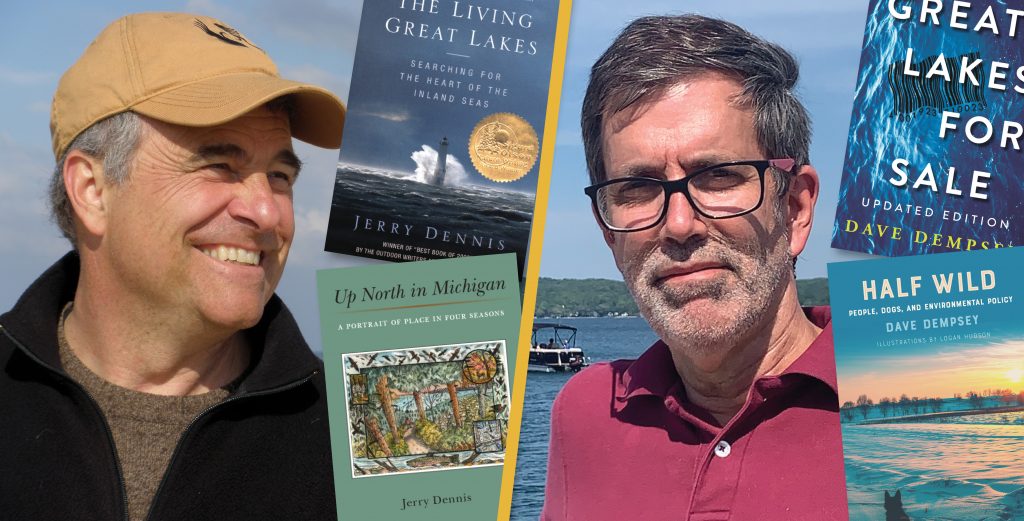
This was originally published in the Traverse City Record-Eagle. You can view the original column here.
The National Writers Series draws authors from all over the country and the world. But no matter who is visiting our fair city — Margaret Atwood, Lee Child, Ann Patchett, Paul Holes, Alice Walker — they’ve all been knocked out by the beauty of our region — and, most of all, by the water around us. The Great Lakes comprise 20 percent of the world’s fresh water and their majesty and importance to the US, and our area, can’t be overestimated.
It’s easy to think the lakes will always lay shimmering on the horizon.
But will they?
Jerry Dennis and Dave Dempsey: Discussing our Greatest Resource
On Aug. 25, the Writers Series is planning a special event with Jerry Dennis and Dave Dempsey, who’ve dedicated their careers as writing about, looking at, defending, and understanding the water around us.
Jerry Dennis, whose works have been translated into five languages, has written a dozen books, including “The Living Great Lakes” and “Up North in Michigan.” In the latter title, Dennis writes of seeing an abundant patch of Pitcher’s thistle, a threatened species that lives only in Great Lakes dunes. Dennis noticed the deep footprints he and others left behind.
“There’s little chance that this popular preserve along the Lake Michigan shore will ever be free of [human] footprints. I’m not sure it should be. We need small wild places where the wild can exist side by side with the civilized. For most of Western history, we’ve insisted that nature and culture are opposites, separated by clear boundaries. But in places like Point Bestie the boundaries blur. And that’s good. The boundaries should blur. They’re porous, after all. Examine them up close and you can see that there’s no clear distinction between the natural and artificial, between inside and outside, between self and world.”
Dennis has published more than a dozen books, most of them illustrated by his friend Glenn Wolff, an acclaimed illustrator, good friend, and also a Traverse City native. Reading them we see where we live with new eyes.
Great Lakes – For Sale?
David Dempsey, with a lifelong connection to the Great Lakes, has prolifically written on the need to protect lakes as if our lives depend on them — because they do.
He has worked for the Michigan Environmental Council, International Joint Commission, the Great Lakes Fishery Commission, and is now a senior advisor to FLOW, whose mission is to protect the Great Lakes basin (and is also our partner for this event).
“Environmental policy may seem abstract, but it begins with deep feelings,” he said. “I’ve loved the Great Lakes since I was a kid and looked out over limitless waters from Sleeping Bear and was awed. That’s why I care — and most people care — about keeping the Great Lakes public and not privately controlled.”
Dempsey’s most recent book — “Great Lakes for Sale” — focuses on the risk of losing control of the Great Lakes by allowing water to be sold like a product. Preserving the lakes will only become more pressing as the West runs out of water.
“We need to be vigilant stewards,” Dempsey said. “Instead, we’re becoming numb. We see water bottles, and we no longer even think about it. We allow bottling companies to exploit our resources. There are people in Detroit and Flint who pay $200 a month for tap water. Meanwhile, Nestle’s — now it’s called Blue Triton Brand — pays $200 a year for tens of millions of gallons of water and they sell it for a profit.”
Dempsey said that FLOW has urged our state government to impose royalties on the extraction of water from Michigan’s environment.
“Royalties are different than a tax. Companies [do] pay for the right to take something from the public domain, including trees, oil or other resources. By establishing royalties you’re not saying it’s a product. The privilege of taking water means compensation to the public.”
Despite pleas from FLOW and others, nothing has happened, Dempsey said. Should it?
What do you think?
Our upcoming event is a special opportunity to look at the beauty of the lakes, and their future:
- Why is there more concern about bottled water than bottled soda pop?
- Why doesn’t the West just desalinate water from the ocean?
- What would be wrong with just taking one inch from the Great Lakes to provide relief to water-parched states?
- Why is Chicago allowed to divert Great Lakes water to the Illinois River?
With environmental journalist Sheri McWhirter serving as guest host, this night is poised to be an amazing one.






